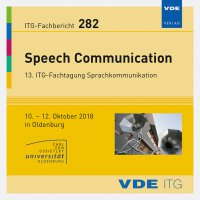Extension of the Framework for auditory discrimination experiments (FADE) to predict the Göttingen (everyday) sentence speech test
Konferenz: Speech Communication - 13. ITG-Fachtagung Sprachkommunikation
10.10.2018 - 12.10.2018 in Oldenburg, Deutschland
Tagungsband: Speech Communication
Seiten: 5Sprache: EnglischTyp: PDF
Persönliche VDE-Mitglieder erhalten auf diesen Artikel 10% Rabatt
Autoren:
Huelsmeier, David; Warzybok, Anna; Schaedler, Marc Rene (Medizinische Physik and Cluster of Excellence Hearing4all, CvO Universität Oldenburg, 26131 Oldenburg, Germany)
Inhalt:
Many speech intelligibility models base predictions only on low-level physical properties of the signals and ignore the task syntax. However, empirical data indicates an influence of the complexity of speech tests on their outcome. The Framework for Auditory Discrimination Experiments, which simulates the speech recognition process with an automatic speech recognition system, was extended to predict speech reception thresholds (SRTs) for two extreme assumptions about the sentence structure: No knowledge and perfect knowledge. The outcomes of three speech tests were predicted and compared to empirical data: Digit triplet test, Matrix sentence test, and Göttingen (everyday) sentence test. The predicted SRTs were highest for the complex speech material of the Göttingen sentence test, with differences between the two extreme assumptions below 2 dB. The empirical outcome was found to lie in-between. The main effect of complexity is suspected to be due to the number of required concurrent hypothesis during recognition.


